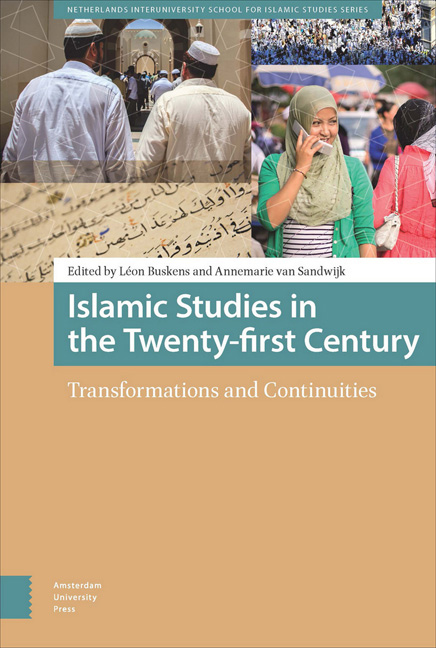Book contents
- Frontmatter
- Dedication
- Contents
- Preface
- Introduction: Dichotomies, Transformations, and Continuities in the Study of Islam
- Islamic Texts: The Anthropologist as Reader
- Textual Aspects of Religious Authority in Premodern Islam
- What to Do with Ritual Texts: Islamic Fiqh Texts and the Study of Islamic Ritual
- Textual Study of Gender
- Scholarship on Gender Politics in the Muslim World: Some Critical Reflections
- Power, Orthodoxy, and Salvation in Classical Islamic Theology
- Dialectical Theology in the Search for Modern Islam
- “Classical” Islamic Legal Theory as Ideology: Nasr Abu Zayd’s Study of al-Shafiʿi’s al-Risala
- Islamic Law in the Modern World: States, Laws, and Constitutions
- Vernacular Cosmopolitanism as an Ethical Disposition: Sufi Networks, Hospitality, and Translocal Inclusivity
- Middle Eastern Studies and Islam: Oscillations and Tensions in an Old Relationship
- Notes on Contributors
- Overview of NISIS Autumn Schools, 2010-2014
- Index
Preface
Published online by Cambridge University Press: 12 December 2020
- Frontmatter
- Dedication
- Contents
- Preface
- Introduction: Dichotomies, Transformations, and Continuities in the Study of Islam
- Islamic Texts: The Anthropologist as Reader
- Textual Aspects of Religious Authority in Premodern Islam
- What to Do with Ritual Texts: Islamic Fiqh Texts and the Study of Islamic Ritual
- Textual Study of Gender
- Scholarship on Gender Politics in the Muslim World: Some Critical Reflections
- Power, Orthodoxy, and Salvation in Classical Islamic Theology
- Dialectical Theology in the Search for Modern Islam
- “Classical” Islamic Legal Theory as Ideology: Nasr Abu Zayd’s Study of al-Shafiʿi’s al-Risala
- Islamic Law in the Modern World: States, Laws, and Constitutions
- Vernacular Cosmopolitanism as an Ethical Disposition: Sufi Networks, Hospitality, and Translocal Inclusivity
- Middle Eastern Studies and Islam: Oscillations and Tensions in an Old Relationship
- Notes on Contributors
- Overview of NISIS Autumn Schools, 2010-2014
- Index
Summary
With pleasure, modest pride and in my quality as chairman of the board of the Netherlands Interuniversity School for Islamic Studies (NISIS), I present to you this volume Islamic Studies in the Twenty-first Century: Transformations and Continuities. It contains a selection of articles written by scholars who were invited to talk about their work at the seasonal schools that were organised by NISIS in the past years. In the introduction to this selection of articles Léon Buskens, academic director of NISIS, will explain how this volume came about. Let me say a few words about NISIS and the scholarly field it covers.
NISIS is a research school, founded in 2010, in which nine Dutch universities participate. The aim of the school is to address Islam in a broad thematic and interdisciplinary way. This broad approach has certainly contributed to the success of NISIS. Through the organisation of seasonal schools every six months and network days where ongoing research is presented, we have created an academic community of researchers working on Islam at Dutch universities. But we have also built up and extended an international academic network of scholars, and we work together closely with several research institutes in and outside Europe. The contributions to this volume are the fruits of this endeavour.
NISIS considers interdisciplinarity and thematic focus not just a hollow mantra to please the academic community, funding agencies, and policy makers. Islam is more than a religion in the strict theological sense. If we confine ourselves to doctrinal normativity and Islamic law to analyse what Muslims motivate and how they build religious landscapes and lifeworlds, we seriously narrow down our understanding of Islam. Conversely, if we consider the rich body of theological work that has been written over centuries, the normative frameworks that guide people, and the canonised practices to which Muslims refer as irrelevant, we also seriously limit analytical rigor.
This may sound as a truism, but in an academic landscape that is still largely dominated by disciplinary boundaries, interests, and money flows it is vital to show that only a broad approach to the study of Islam can overcome disciplinary myopia.
- Type
- Chapter
- Information
- Islamic Studies in the Twenty-first CenturyTransformations and Continuities, pp. 9 - 10Publisher: Amsterdam University PressPrint publication year: 2017



